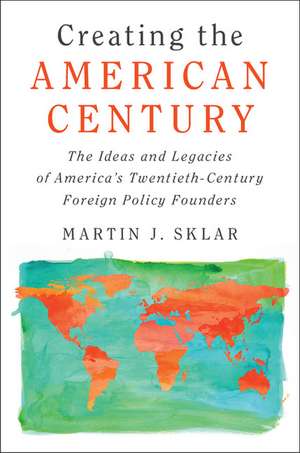Creating the American Century: The Ideas and Legacies of America's Twentieth-Century Foreign Policy Founders
Autor Martin J. Sklar Nao Hauseren Limba Engleză Paperback – 4 oct 2017
| Toate formatele și edițiile | Preț | Express |
|---|---|---|
| Paperback (1) | 192.28 lei 6-8 săpt. | |
| Cambridge University Press – 4 oct 2017 | 192.28 lei 6-8 săpt. | |
| Hardback (1) | 686.18 lei 6-8 săpt. | |
| Cambridge University Press – 4 oct 2017 | 686.18 lei 6-8 săpt. |
Preț: 192.28 lei
Nou
Puncte Express: 288
Preț estimativ în valută:
36.80€ • 39.99$ • 30.94£
36.80€ • 39.99$ • 30.94£
Carte tipărită la comandă
Livrare economică 22 aprilie-06 mai
Preluare comenzi: 021 569.72.76
Specificații
ISBN-13: 9781108409247
ISBN-10: 1108409245
Pagini: 270
Dimensiuni: 152 x 228 x 15 mm
Greutate: 0.37 kg
Editura: Cambridge University Press
Colecția Cambridge University Press
Locul publicării:New York, United States
ISBN-10: 1108409245
Pagini: 270
Dimensiuni: 152 x 228 x 15 mm
Greutate: 0.37 kg
Editura: Cambridge University Press
Colecția Cambridge University Press
Locul publicării:New York, United States
Cuprins
Preface; Part I. Origins: 1. The Philippines, China, and US global objects (the conant factor); 2. A panel at the AEA; Part II. THE FOUNDERS' AMERICAN CENTURY: THE TALE ONCE-Told: 3. World history: evolving cycles of empires; 4. US history: in the evolving cycle; 5. 20th-Century world politics and the US role: moving beyond the cycle to universal evolution; Part III. HISTORY'S AMERICAN CENTURY: THE TALE TWICE-Told: 6. 1898 to 1941: American century-birth and awkward youth; 7. World War and Cold War: American century – young adulthood; 8. Post-Cold War and 9/11: American century arrived; 9. American century fulfilled and revoked, or nullified: from empires to a universal humanity? Or, cycles forever?; Part IV. Bringing History Back In: 10. History in the US, the US in history.
Recenzii
'Essential reading for historians - and for historically-oriented policy advisors and officials. Sklar recapitulates, updates, and expands his earlier pathbreaking explorations of the American liberal society type and its influential role in the world. To previous conceptual innovations ('corporate liberalism', 'disaccumulation', 'capitalism-socialism mix'), Sklar adds 'transvestiture of left and right'.' Norton Wheeler, University of Tennessee, Chattanooga
'In this provocative book, the late Martin J. Sklar urges us to put aside the simplistic debates over unilateral versus multilateral, realist versus idealist, isolationist versus globalist, and to recover the more subtle understandings of the 'founders' of US foreign policy who emerged in the late nineteenth and early twentieth century. Far from a nation with a short-term memory, America, in Sklar's telling, pursued a consistent policy that at first sought a dominant world position so as to bring about decolonization and, later, a world without a dominant hegemon. Creating the American Century will challenge students of American foreign policy and those who wish to understand the US's role in the world today.' John Yoo, University of California, Berkeley
'In this provocative book, the late Martin J. Sklar urges us to put aside the simplistic debates over unilateral versus multilateral, realist versus idealist, isolationist versus globalist, and to recover the more subtle understandings of the 'founders' of US foreign policy who emerged in the late nineteenth and early twentieth century. Far from a nation with a short-term memory, America, in Sklar's telling, pursued a consistent policy that at first sought a dominant world position so as to bring about decolonization and, later, a world without a dominant hegemon. Creating the American Century will challenge students of American foreign policy and those who wish to understand the US's role in the world today.' John Yoo, University of California, Berkeley
Notă biografică
Descriere
Late historian Martin J. Sklar's analysis of how modernizing worldwide development has been the focus of US foreign policy.
